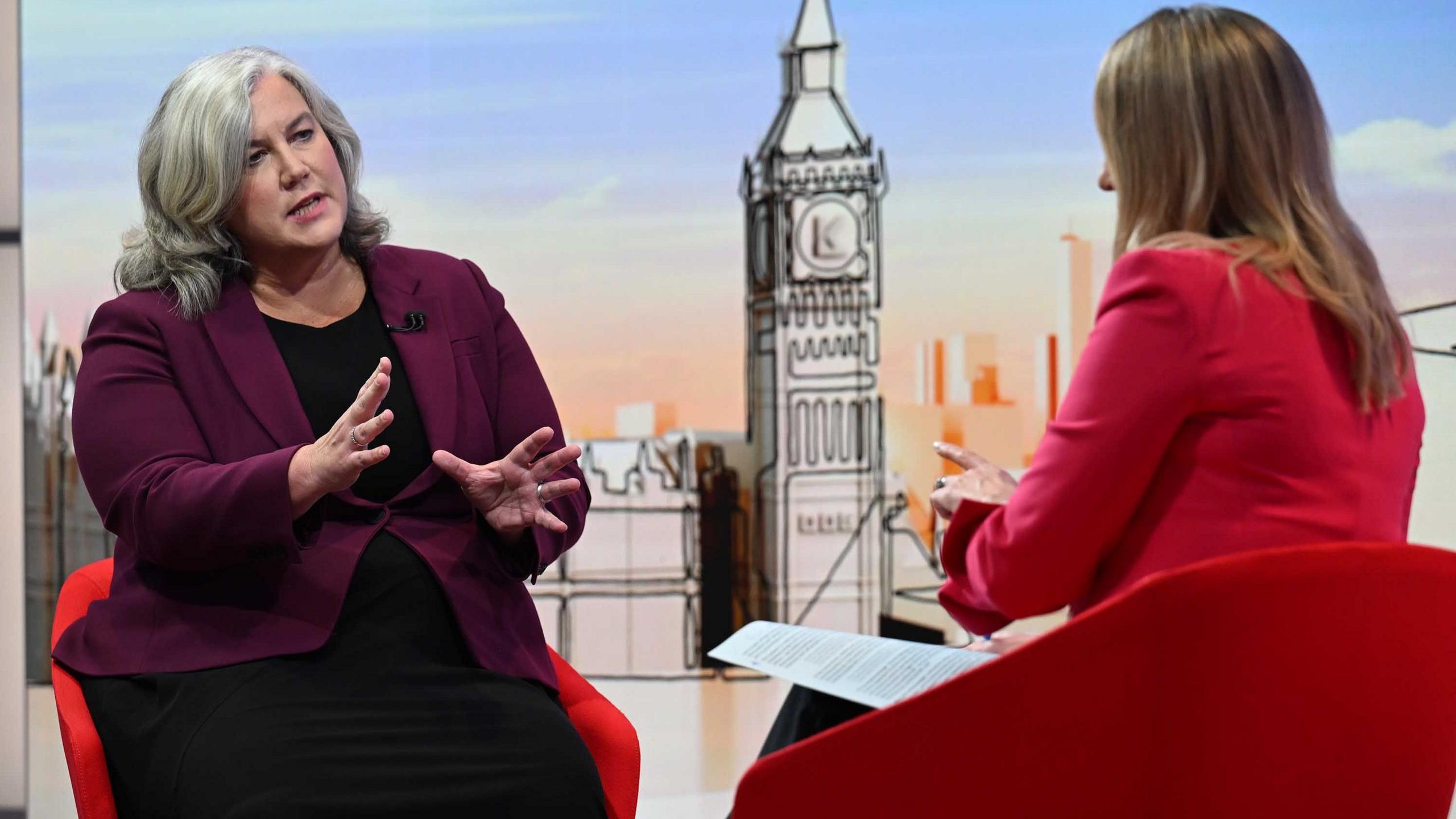Minister denies Budget leaks have damaged economy

- Published
Transport Secretary Heidi Alexander has denied leaks ahead of the Budget have damaged the economy, following criticism the speculation has "caused paralysis among businesses and consumers".
Recent months have been dominated by media reports about which taxes could increase, with multiple potential measures floated by the government.
Former Bank of England chief economist Andy Haldane told the BBC's Sunday with Laura Kuenssberg programme this was "the single biggest reason why [economic] growth has flatlined".
In response, Alexander said there was always speculation in the run-up to Budgets but the chancellor had been clear about her priorities.
Chancellor Rachel Reeves is widely expected to increase taxes in her Budget on Wednesday to help fill a multibillion-pound gap in her spending plans.
Ministers had given strong indications the government was planning to increase income tax rates.
Anonymous briefings to the media from government sources had also suggested Reeves was considering the move - which would have been a clear breach of Labour's election promise not to raise "the basic, higher or additional rates of income tax".
However, last week government sources said Reeves had decided against this after better-than-expected economic forecasts.
Governments sometimes choose to leak aspects of their Budget plans to the media, either to test public reaction or prepare the ground for measures so they do not come as a shock to financial markets or voters.
Fear and scepticism as Reeves prepares for her big Budget moment
- Published1 day ago
Everything you need to know about the Budget
- Published3 days ago
Haldane branded the months of speculation about potential Budget measures a "fiscal fandango".
"That's been costly for the economy," he told the programme.
"It's caused paralysis among businesses and consumers."
He said the Budget process was "too lengthy, too leaky, with real costs".
Haldane acknowledged this "pantomime" had also happened under previous governments, adding that the "budgetary process has been degraded over many years".
Challenged over whether the leaks had damaged the economy, Alexander told the programme: "People always speculate in advance of a Budget and we have always said 'wait until the Budget'."
Defending the government's approach, she said the Budget process had taken place "on shifting sands", with a downgrade to productivity forecasts and "a very challenging global economic environment".
The Conservatives have called for an investigation into pre-Budget leaks, saying they have "real world consequences including for financial markets".
In a letter to the Treasury's most senior civil servant, external, shadow chancellor Mel Stride said: "Either ministers have approved the widespread briefing of confidential information surrounding the Budget, or serious unauthorised leaks have occurred within your department."
The chancellor is expected to set out a range of smaller tax rises in her Budget, after backing away from increasing income tax rates.
However, the government has not ruled out extending the freeze on income tax thresholds - the level people start paying tax or have to pay higher rates.
The freeze means any pay rise would see people paying more tax, with more people dragged into a higher tax band, or having to pay tax on their income for the first time.
Reeves has also said there will be a focus on cutting the cost-of-living, with the government announcing that rail fares in England will be frozen next year for the first time in decades.
Other priorities set out by the chancellor include reducing NHS waiting lists and the national debt.
Meanwhile, she is also expected to scrap the two-child benefit cap, a limit that means parents can only claim universal credit or tax credits for their first two children.
There has been pressure from Labour MPs to remove the cap, which was introduced under the Conservatives - a move that could cost more than £3bn.
While she refused to confirm the cap would be scrapped, Alexander said tackling child poverty was "in the DNA of the Labour Party".
"One of the defining elements of this government for me is about what we can do to ensure that children's chances in life aren't determined by the size of their parents' bank balance," she added.
The Conservatives have argued against removing the cap, with Stride telling the BBC it was "a matter of fairness" that parents who are on benefits should have to make the same choices about whether they can afford a bigger family as those who are not.
The shadow chancellor told Kuenssberg: "The big choice at this Budget now is does the chancellor have the backbone to control government spending, particularly in the area of welfare where some of those costs are spiralling out of control, take those tough choices and therefore not have to start putting up taxes again in areas that are going to damage the economy."
However, Green Party leader Zack Polanski said scrapping the cap would be a "victory" and it was "outrageous that it's taken the Labour government so long to do it".
He called for the government to "tax the rich", rather than hit "people out of work or working people who are working really hard while their wages aren't going up".

Sign up for our Politics Essential newsletter to keep up with the inner workings of Westminster and beyond.